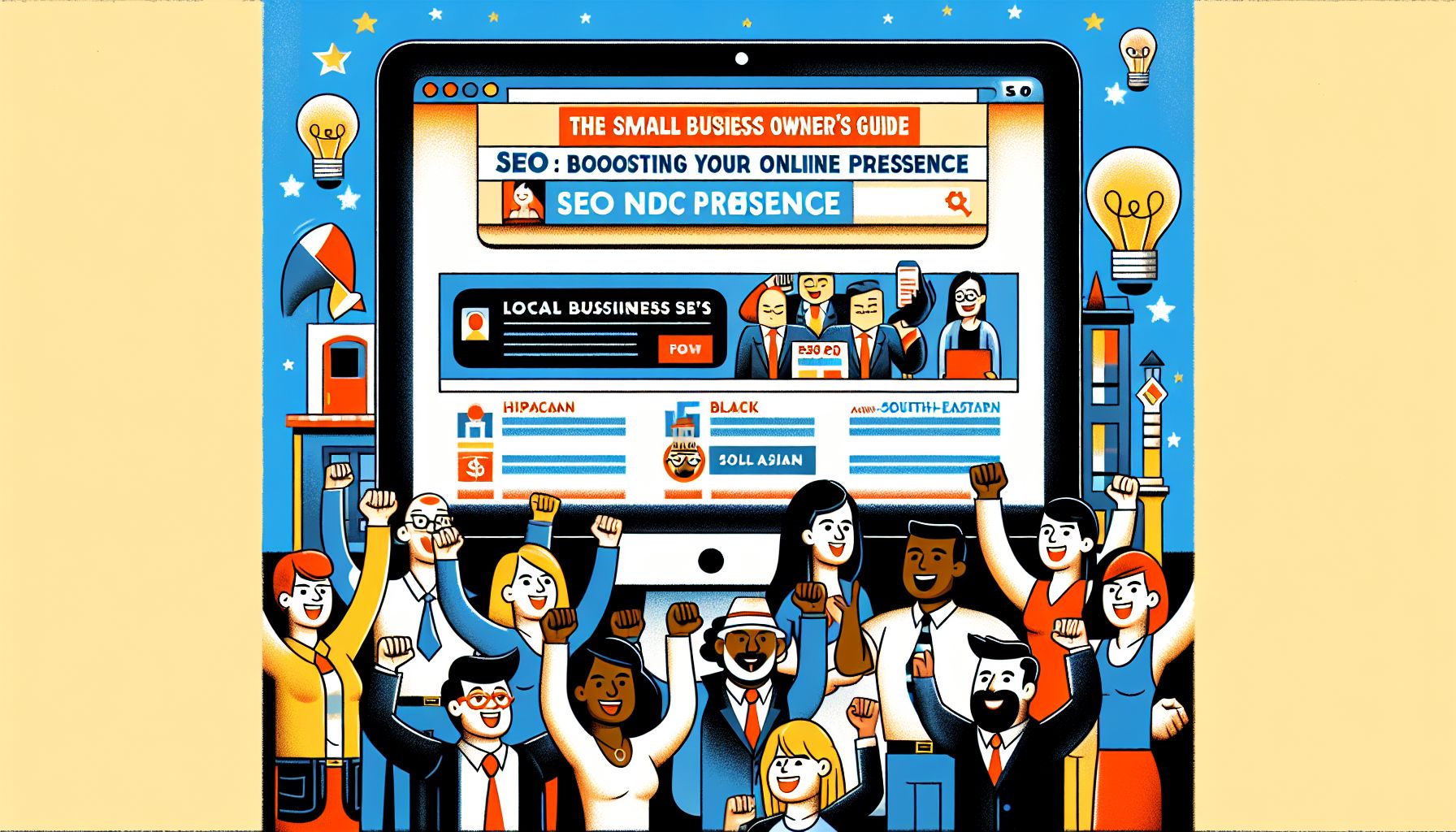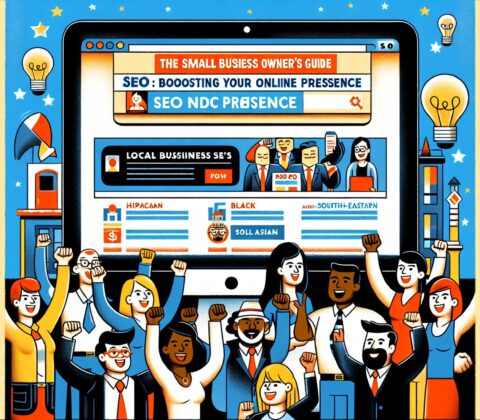

Web Design 101 for Business Owners: Why It Matters and How to Get It Right
As a business owner, you know the importance of having a strong online presence. Your website is often the first point of contact between your company and potential customers, so it’s crucial that it leaves a positive impression. In today’s digital age, having a well-designed website is no longer just a nice-to-have – it’s a necessity.
Why Web Design Matters
Your website is essentially your digital storefront. Just as you wouldn’t neglect the appearance of your physical store, you shouldn’t overlook the design of your online presence. A well-designed website not only attracts visitors, but it also keeps them engaged and encourages them to explore further. On the other hand, a poorly designed website can drive potential customers away, leading to lost sales opportunities.
In addition to aesthetics, web design also plays a critical role in user experience. A user-friendly website with intuitive navigation and clear calls-to-action can help guide visitors through the sales funnel, ultimately leading to conversions. On the flip side, a confusing or cluttered website can leave users frustrated and more likely to bounce.
How to Get It Right
Now that you understand the importance of web design, let’s discuss how you can ensure your website is up to par:
-
Establish a Clear Brand Identity: Your website should reflect your brand’s identity, from the color scheme to the tone of voice. Consistency is key in building brand recognition and trust.
-
Prioritize User Experience: Put yourself in the shoes of your visitors and think about what they would want to see and how they would want to interact with your site. Make sure your website is easy to navigate and provides valuable content.
-
Mobile-Friendly Design: With a growing number of users browsing the web on mobile devices, it’s essential that your website is responsive and optimized for different screen sizes. A mobile-friendly design is not only user-friendly but also favored by search engines like Google.
-
Optimize for SEO: Good web design goes hand in hand with good SEO practices. Make sure your website is optimized for search engines by using relevant keywords, meta tags, and a clean URL structure.
-
Keep It Simple: While it’s tempting to include flashy animations and intricate designs, simplicity often wins in web design. A clean and minimalist layout not only looks modern but also enhances usability.
-
Test and Iterate: Don’t set and forget your website design. Regularly test different elements, gather feedback from users, and make data-driven decisions to improve your website over time.
Conclusion
In today’s digital landscape, a well-designed website is a business essential. By focusing on branding, user experience, mobile optimization, SEO, simplicity, and continuous improvement, you can create a website that not only looks great but also drives results for your business. Remember, your website is often the first impression customers have of your company, so make it count.


The Power of Internet Marketing for Small Business Owners
Are you a small business owner looking to grow your customer base and increase your revenue? One powerful tool you should consider is internet marketing. In today’s digital age, having a strong online presence is essential for business success. Whether you’re a local brick-and-mortar store or an online-only operation, internet marketing can help you reach new customers and drive sales. In this blog post, we’ll discuss the benefits of internet marketing for small business owners and provide some practical tips for getting started.
Why Internet Marketing Matters
Internet marketing allows you to reach a global audience without breaking the bank. Unlike traditional advertising methods like print or TV ads, online marketing is often more cost-effective and offers a higher return on investment. With internet marketing, you can target specific demographics, track the performance of your campaigns in real-time, and make adjustments on the fly. This level of flexibility and control is invaluable for small business owners with limited resources.
Another advantage of internet marketing is its ability to level the playing field. In the digital world, small businesses can compete with larger corporations for the attention of consumers. With the right strategy, even a one-person operation can attract a loyal following and build a thriving business online. By harnessing the power of social media, search engine optimization, and email marketing, small business owners can create a strong brand presence and connect with customers in meaningful ways.
How to Get Started with Internet Marketing
If you’re new to internet marketing, the thought of diving into this vast and ever-evolving field can be overwhelming. But don’t worry – we’re here to help! Here are some practical tips to help you get started with internet marketing for your small business:
-
Define your goals: Before you start any marketing campaign, it’s important to have a clear understanding of what you want to achieve. Are you looking to increase website traffic, generate leads, or boost sales? By setting specific, measurable goals, you can create a targeted strategy that will drive results.
-
Identify your target audience: To effectively reach your customers online, you need to know who they are and where they spend their time. Conduct market research to understand the needs, preferences, and behaviors of your target audience. This information will help you tailor your messaging and choose the most appropriate channels for reaching your customers.
-
Build a strong online presence: Your website is the cornerstone of your online marketing efforts. Make sure your site is mobile-friendly, easy to navigate, and optimized for search engines. Create compelling content that showcases your products or services and provides value to your visitors. Consider starting a blog or posting regular updates on social media to keep your audience engaged.
-
Use social media to connect with customers: Social media platforms like Facebook, Instagram, and Twitter are powerful tools for building relationships with your customers and driving traffic to your website. Create a social media strategy that aligns with your brand voice and values, and engage with your audience regularly by sharing updates, promotions, and valuable content.
-
Invest in search engine optimization (SEO): SEO is the process of optimizing your website to rank higher in search engine results. By improving your site’s visibility on Google and other search engines, you can attract more organic traffic and increase your chances of converting visitors into customers. Consider hiring an SEO expert or using online tools to help you improve your website’s search rankings.
Conclusion
Internet marketing is a game-changer for small business owners looking to grow their businesses and reach new audiences. By leveraging the power of online channels like social media, search engines, and email, you can create a strong brand presence, connect with customers, and drive sales. With the right strategy and a willingness to experiment, internet marketing can take your small business to the next level. So what are you waiting for? Get started today and watch your business soar!


The Small Business Owner’s Guide to SEO
As a small business owner, you know how important it is to have a strong online presence in today’s digital world. One way to increase your visibility and reach a larger audience is through search engine optimization (SEO). SEO is the practice of optimizing your website so that it ranks higher in search engine results pages, making it easier for potential customers to find you. In this article, we’ll break down some key SEO strategies that small business owners can implement to improve their online visibility and attract more customers.
Understanding Keywords
Keywords are the foundation of SEO. They are the phrases that people type into search engines when looking for products or services like yours. To improve your website’s SEO, you need to identify the keywords that are relevant to your business and incorporate them into your website content. This includes your website copy, meta tags, and blog posts. By using the right keywords, you can increase your chances of ranking higher in search engine results pages and driving more organic traffic to your website.
Content is King
In addition to using keywords, creating high-quality, engaging content is essential for SEO success. Search engines like Google prioritize websites that offer valuable information to users. This means that you should regularly update your website with fresh, relevant content that is tailored to your target audience. Whether it’s blog posts, videos, or infographics, providing valuable content will not only help improve your website’s SEO but also establish your business as an authority in your industry.
Mobile-Friendliness
With the rise of mobile devices, having a mobile-friendly website is crucial for SEO. Search engines like Google prioritize mobile-friendly websites in their search results, so if your website is not optimized for mobile users, you could be missing out on potential customers. Make sure your website is responsive and loads quickly on all devices to improve your SEO rankings and provide a better user experience for your visitors.
Local SEO
For small businesses that rely on local customers, local SEO is a must. Local SEO is the practice of optimizing your website for local search queries, such as “restaurants near me” or “plumbers in [city]”. To improve your local SEO, make sure your business name, address, and phone number (NAP) are consistent across all online directories and listings. You should also create a Google My Business profile and encourage customers to leave reviews, as positive reviews can help improve your local search rankings.
Link Building
Link building is another important aspect of SEO. Search engines like Google consider the number and quality of inbound links to your website when determining its authority and relevance. To improve your website’s SEO, try to get backlinks from reputable websites in your industry. You can do this by reaching out to bloggers, influencers, and journalists and asking them to link to your website. You can also guest post on other websites and include a link back to your site in your author bio.
Conclusion
SEO is a powerful tool for small business owners looking to improve their online visibility and attract more customers. By implementing these key SEO strategies, you can increase your website’s rankings in search engine results pages and drive more organic traffic to your site. Remember to conduct keyword research, create valuable content, optimize your website for mobile users, focus on local SEO, and build high-quality backlinks to improve your website’s SEO performance. With time and effort, you’ll see the benefits of a well-executed SEO strategy and watch your business grow.


The Small Business Owner’s Guide to SEO: Boosting Your Online Presence
If you’re a small business owner looking to make a big impact online, search engine optimization (SEO) is your ticket to success. In today’s digital age, having a strong online presence is essential for attracting new customers and growing your business. SEO is the key to getting your website noticed by search engines like Google, Bing, and Yahoo, and ultimately, by potential customers.
So, what exactly is SEO? In a nutshell, SEO is the practice of optimizing your website and its content to rank higher in search engine results pages (SERPs). By implementing SEO techniques on your site, you can improve your visibility, drive organic traffic, and increase your chances of converting visitors into customers.
Here are a few key SEO strategies that small business owners can implement to boost their online presence:
-
Keyword Research: Start by identifying relevant keywords that your target audience is likely to use when searching for your products or services. Use tools like Google Keyword Planner or SEMrush to help you discover high-volume, low-competition keywords that you can incorporate into your website content.
-
On-Page Optimization: Once you’ve identified your target keywords, strategically place them throughout your website’s copy, meta tags, and headers. Make sure your content is high-quality, informative, and relevant to your audience. Optimize your images, URLs, and meta descriptions to further improve your site’s SEO.
-
Mobile-Friendliness: With more and more users accessing websites on mobile devices, it’s crucial that your site is mobile-friendly. Google gives preference to mobile-responsive sites in its search rankings, so make sure your website is optimized for mobile users.
-
Local SEO: If you have a physical storefront or serve customers in a specific area, local SEO can help you attract nearby customers. Create a Google My Business profile, optimize your contact information, and encourage customers to leave positive reviews to improve your local search rankings.
-
Link Building: Build relationships with other websites in your industry and earn high-quality backlinks to your site. Guest posting, collaborating with influencers, and participating in online communities are all effective ways to build inbound links and improve your site’s authority.
-
Regular Content Updates: Search engines love fresh, relevant content, so make sure to regularly update your website with new blog posts, product descriptions, or other valuable content. This will not only keep your audience engaged but also signal to search engines that your site is active and up-to-date.
-
Monitor and Analyze: Finally, it’s important to regularly monitor your site’s performance using tools like Google Analytics. Track your search engine rankings, organic traffic, and conversion rates to identify areas for improvement and adjust your SEO strategy accordingly.
By implementing these SEO strategies, small business owners can improve their online visibility, attract more organic traffic, and ultimately, grow their business. Remember, SEO is an ongoing process that requires time, effort, and patience, but the results are well worth it. So, roll up your sleeves, get started on optimizing your website, and watch your online presence soar!


How to Boost Your Business with SEO: A Guide for Business Owners
Do you own a business and want to increase your online visibility? Look no further than Search Engine Optimization (SEO)! SEO is a powerful tool that can help your business rank higher on search engines like Google, ultimately driving more traffic to your website and increasing your customer base. In this guide, we’ll break down the basics of SEO and provide you with tips on how to optimize your website for maximum visibility.
What is SEO?
SEO is the practice of increasing the quantity and quality of traffic to your website through organic search engine results. In simpler terms, SEO helps your website rank higher on search engine results pages (SERPs) so that more people can find and visit your site. By optimizing your website for relevant keywords and improving its overall user experience, you can attract more potential customers and increase your online presence.
Why is SEO Important for Your Business?
In today’s digital age, having a strong online presence is crucial for the success of any business. With millions of websites competing for attention, it’s essential to stand out from the crowd and make sure that potential customers can easily find your business online. By investing in SEO, you can improve your website’s visibility, drive targeted traffic to your site, and ultimately boost your sales and revenue.
Tips for Optimizing Your Website
Now that you understand the importance of SEO for your business, here are some tips to help you optimize your website and improve your online visibility:
- Conduct keyword research: Identify relevant keywords that your target audience is searching for and incorporate them into your website’s content.
- Optimize your on-page elements: Make sure that your website’s title tags, meta descriptions, and headings are optimized for search engines.
- Improve your website’s user experience: Ensure that your website is easy to navigate, mobile-friendly, and loads quickly.
- Create high-quality content: Publish relevant, engaging, and informative content that will attract and retain visitors to your site.
- Build high-quality backlinks: Earn links from reputable websites to improve your website’s authority and credibility.
By following these tips and implementing best practices for SEO, you can enhance your website’s visibility, attract more traffic, and ultimately grow your business online.
Conclusion
In conclusion, SEO is a powerful tool that can help business owners increase their online visibility, attract more customers, and boost their sales and revenue. By optimizing your website for search engines and following best practices for SEO, you can improve your website’s ranking on search engine results pages and reach a larger audience. So, what are you waiting for? Start investing in SEO today and watch your business thrive online!